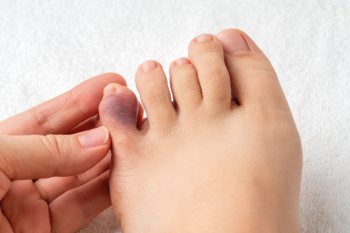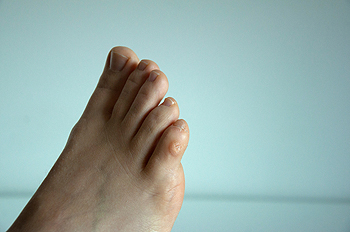
(908) 381-8160Berkeley Heights

Tarsal tunnel syndrome, also known as posterior tibial neuralgia, is caused by compression of the posterior tibial nerve as it travels through the tarsal tunnel along the inside of the ankle. This compression can lead to pain, tingling, numbness, or a burning sensation in the foot and ankle. Risk factors for developing tarsal tunnel syndrome include having flat feet, which can stretch the nerve, previous ankle injuries that cause swelling, or conditions like arthritis and diabetes that lead to nerve damage or inflammation. Symptoms may worsen with prolonged standing, walking, or physical activity and pain can radiate into the toes or heel. If you have pain in this part of your foot, it is suggested that you visit a podiatrist for an accurate diagnosis and treatment.
Tarsal tunnel syndrome can be very uncomfortable to live with. If you are experiencing tarsal tunnel syndrome, contact Dr. Janet Leicht of New Jersey. Our doctor can provide the care you need to keep you pain-free and on your feet.
Tarsal Tunnel Syndrome
Tarsal tunnel syndrome, which can also be called tibial nerve dysfunction, is an uncommon condition of misfiring peripheral nerves in the foot. The tibial nerve is the peripheral nerve in the leg responsible for sensation and movement of the foot and calf muscles. In tarsal tunnel syndrome, the tibial nerve is damaged, causing problems with movement and feeling in the foot of the affected leg.
Common Cause of Tarsal Tunnel Syndrome
The Effects of Tarsal Tunnel Syndrome
A physical exam of the leg can help identify the presence of tarsal tunnel syndrome. Medical tests, such as a nerve biopsy, are also used to diagnose the condition. Patients may receive physical therapy and prescriptive medication. In extreme cases, some may require surgery.
If you have any questions please feel free to contact our office located in Berkeley Heights, NJ . We offer the newest diagnostic and treatment technologies for all your foot and ankle needs.

Hiking with ankle pain requires extra care and thoughtful planning to prevent further injury and enjoy the experience. Choosing smaller, well-maintained trails can help reduce stress on the ankle by providing even surfaces and shorter distances to manage. It is important to wear supportive hiking shoes or boots that stabilize the ankle and cushion each step. Carrying light loads can make a big difference, as heavy backpacks place added pressure on the joints and increase fatigue. Maintaining a healthy weight also supports the ankles by easing the strain placed on them during movement. Taking breaks when needed and using trekking poles for balance can enhance comfort and reduce the risk of aggravating the pain. If you enjoy hiking and have developed ankle pain, it is suggested that you consult a podiatrist who can offer effective management tips, providing a more enjoyable hiking experience.
Ankle pain can have many different causes and the pain may potentially be serious. If you have ankle pain, consult with Dr. Janet Leicht from New Jersey. Our doctor will assess your condition and provide you with quality foot and ankle treatment.
Ankle pain is any condition that causes pain in the ankle. Due to the fact that the ankle consists of tendons, muscles, bones, and ligaments, ankle pain can come from a number of different conditions.
Causes
The most common causes of ankle pain include:
Symptoms
Symptoms of ankle injury vary based upon the condition. Pain may include general pain and discomfort, swelling, aching, redness, bruising, burning or stabbing sensations, and/or loss of sensation.
Diagnosis
Due to the wide variety of potential causes of ankle pain, podiatrists will utilize a number of different methods to properly diagnose ankle pain. This can include asking for personal and family medical histories and of any recent injuries. Further diagnosis may include sensation tests, a physical examination, and potentially x-rays or other imaging tests.
Treatment
Just as the range of causes varies widely, so do treatments. Some more common treatments are rest, ice packs, keeping pressure off the foot, orthotics and braces, medication for inflammation and pain, and surgery.
If you have any questions, please feel free to contact our office located in Berkeley Heights, NJ . We offer the newest diagnostic and treatment technologies for all your foot care needs.

A broken pinky toe often occurs from direct trauma, such as stubbing the toe against furniture or dropping a heavy object on the foot. It can also result from repetitive stress or overuse during physical activities that place pressure on the feet. Individuals with weakened bones or poor footwear support may be more susceptible. Symptoms of a broken pinky toe include sharp or throbbing pain, swelling, and visible bruising. The toe may appear crooked or misaligned, and walking can become difficult due to discomfort or instability. In some cases, the pain may persist even at rest. If you have broken your pinky toe, it is suggested that you promptly contact a podiatrist who can offer you appropriate treatment solutions.
A broken toe can be very painful and lead to complications if not properly fixed. If you have any concerns about your feet, contact Dr. Janet Leicht from New Jersey. Our doctor will treat your foot and ankle needs.
What to Know About a Broken Toe
Although most people try to avoid foot trauma such as banging, stubbing, or dropping heavy objects on their feet, the unfortunate fact is that it is a common occurrence. Given the fact that toes are positioned in front of the feet, they typically sustain the brunt of such trauma. When trauma occurs to a toe, the result can be a painful break (fracture).
Symptoms of a Broken Toe
Generally, it is best to stay off of the injured toe with the affected foot elevated.
Severe toe fractures may be treated with a splint, cast, and in some cases, minor surgery. Due to its position and the pressure it endures with daily activity, future complications can occur if the big toe is not properly treated.
If you have any questions please feel free to contact our office located in Berkeley Heights, NJ . We offer the newest diagnostic and treatment technologies for all your foot and ankle needs.

Corns are thickened areas of skin that usually develop on or between the toes as the result of constant pressure or friction. Corns on the toes or feet can make walking difficult and painful, especially when the affected area rubs against the inside of your shoe. A defining feature of a corn is its hardened core, which can press into the deeper layers of skin and cause sharp pain or tenderness that limits mobility. Symptoms may include dry, flaky skin, discomfort when wearing shoes, and raised, rough bumps that are painful to the touch. Poorly fitting footwear is a common cause of corns, especially styles that crowd the toes or create pressure points. A podiatrist can provide treatment to safely remove a corn as well as suggest prevention strategies. If you have foot pain that is caused by a corn, it is suggested that you schedule an appointment with a podiatrist for an exam and appropriate treatment.
If you have any concerns regarding your feet and ankles, contact Dr. Janet Leicht of New Jersey. Our doctor will treat your foot and ankle needs.
Corns: What Are They? and How Do You Get Rid of Them?
Corns can be described as areas of the skin that have thickened to the point of becoming painful or irritating. They are often layers and layers of the skin that have become dry and rough, and are normally smaller than calluses.
Ways to Prevent Corns
There are many ways to get rid of painful corns such as wearing:
Treating Corns
Treatment of corns involves removing the dead skin that has built up in the specific area of the foot. Consult with Our doctor to determine the best treatment option for your case of corns.
If you have any questions please feel free to contact our office located in Berkeley Heights, NJ . We offer the newest diagnostic and treatment technologies for all your foot and ankle needs.